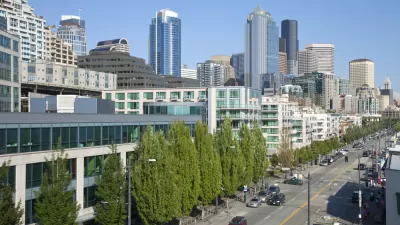As parking reform takes to multi-family housing, the detached single family home has largely escaped discussion. Should it? Seattle (of course) is taking the lead. Also, is all of Minneapolis ready to eliminate parking minimums along transit lines?
Streetsblog's managing editor Brad Aaron addresses two innovative parking reforms proposed in two progressive cities. Seattle considers doing away with the requirement of driveways and garages for single family housing while north Minneapolis debates whether it should be exempted from the proposed ordinance to eliminate parking minimums for multifamily housing developments served by high-frequency bus and rail lines.
As posted here July 8, a Seattle citizens committee has recommended "replacing single-family zoning with a 'lower density residential zone'." "That’s not all," writes Aaron. "The [committee's] draft questions the necessity of a parking spot for every single-family home." The draft is excerpted in a piece by Erica C. Barnett in the Seattle Transit Blog.
Requiring one off-street parking space for every single family home is an artifact of an earlier era and is not a necessary or effective requirement. The space occupied by an off-street garage or parking space could be used instead to accommodate space for housing, including an accessory dwelling unit.
Last month a post here spotlighted a "proposal (that) would eliminate all minimum off-street parking requirements for residential developments very close to high-frequency transit stops." "However, City Council President Barb Johnson wants to exclude neighborhoods in north Minneapolis from the parking reforms," writes Aaron.
The controversy is not unlike those seen elsewhere - some focus on the neighborhood as it is now; others look at what it could be with if restrictions were relaxed.
Resident Jeff Skrenes makes the case for the exclusion in his blog, North by Northside.
- (L)et's talk about those high-frequency bus routes. As a sole factor in contributing to the ordinance, that metric doesn't do north Minneapolis justice. The question that should come up for anyone who has used public transit on the northside is, "Where do those buses GO?"
- North Minneapolis doesn't have the same bike amenities as the rest of the city. We are not a dense, walkable community (yet) that allows residents to meet daily needs on foot, bike, or transit. Until those inequities are addressed, the wholesale removal of parking requirements does a disservice to those who would live in such housing.
in Streets.mn.
- North Minneapolis, particularly Camden, needs multi-family development. Being exempt from the parking ordinance–increasing development costs by hundreds of thousands to millions of dollars–will keep developers from considering Camden.
- Let’s be very clear here: if we don’t create more multi-family housing options with greater density, increasing the population along our transit corridors, we will not get those improved transportation option.
Since our last post on the controversial ordinance by Council Member Lisa Bender, "(t)he measure cleared the city’s planning commission on a narrow 4-3 vote (on June 15, agenda item #7), presaging what may be the largest test yet of the new council’s willingness to challenge long-standing auto-centric policies," writes Eric Roper of the Star Tribune. Arguments to exempt the northside did not prevail.
FULL STORY: More Affordable Housing, Fewer Driveways

Alabama: Trump Terminates Settlements for Black Communities Harmed By Raw Sewage
Trump deemed the landmark civil rights agreement “illegal DEI and environmental justice policy.”

Study: Maui’s Plan to Convert Vacation Rentals to Long-Term Housing Could Cause Nearly $1 Billion Economic Loss
The plan would reduce visitor accommodation by 25% resulting in 1,900 jobs lost.

Planetizen Federal Action Tracker
A weekly monitor of how Trump’s orders and actions are impacting planners and planning in America.

Waymo Gets Permission to Map SF’s Market Street
If allowed to operate on the traffic-restricted street, Waymo’s autonomous taxis would have a leg up over ride-hailing competitors — and counter the city’s efforts to grow bike and pedestrian on the thoroughfare.

Parklet Symposium Highlights the Success of Shared Spaces
Parklets got a boost during the Covid-19 pandemic, when the concept was translated to outdoor dining programs that offered restaurants a lifeline during the shutdown.

Federal Homelessness Agency Places Entire Staff on Leave
The U.S. Interagency Council on Homelessness is the only federal agency dedicated to preventing and ending homelessness.
Urban Design for Planners 1: Software Tools
This six-course series explores essential urban design concepts using open source software and equips planners with the tools they need to participate fully in the urban design process.
Planning for Universal Design
Learn the tools for implementing Universal Design in planning regulations.
Caltrans
Smith Gee Studio
Institute for Housing and Urban Development Studies (IHS)
City of Grandview
Harvard GSD Executive Education
Toledo-Lucas County Plan Commissions
Salt Lake City
NYU Wagner Graduate School of Public Service





























